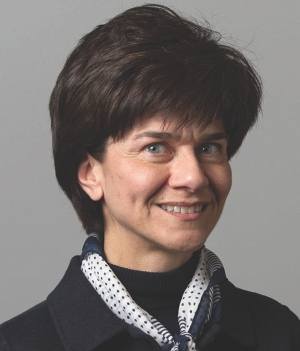For the first time, a new study published in September 2021 analyzed genomic mutations or changes seen in lung cancer in people who have never smoked, showing that most of these lung cancers were caused by natural gene or DNA changes in the body.1
It has become increasingly clear that lung cancer can be caused by different factors, including some environmental chemicals. Understanding the exact causes of different types of lung cancer can help to develop new therapies.
In fact, drug manufacturers have been focusing on different alterations in patients with non–small-cell lung cancer (NSCLC), as evidenced by newer types of immunotherapies and targeted therapies that target a specific genomic mutation or DNA alteration.

© National Cancer Institute.
“What we’re seeing is that there are different subtypes of lung cancer in never smokers that have distinct molecular characteristics and evolutionary processes,” said Maria Teresa Landi, MD, PhD, an epidemiologist at the NCI’s Division of Cancer Epidemiology and Genetics, who led the study. “In the future we may be able to have different treatments based on these subtypes.”
This large study compared the genomic changes in lung cancer tissue from 232 never smokers who had been diagnosed with NSCLC versus normal tissue. Most of the mutations in the tumors of never smokers were linked to damage from natural processes in the body.
This genomic analysis revealed 3 new subtypes of NSCLC in never smokers, which were named by musical terms based on the number of genomic changes in the tumors.
The dominant subtype was named “piano” (or small), which is rare in smokers, and included, among others, the somatic mutation UBA1, the germline AR mutations, and KRAS mutations. This subtype grows slowly over many years; because it has many driver mutations, it is currently difficult to treat.
The “mezzo-forte” subtype involves changes in the chromosomes and in the EGFR gene, a gene that is associated with many subtypes of NSCLC.
The third subtype was named “forte,” involving a genomic change seen in lung cancer caused by smoking, which grows quickly. In all, 5 genomic changes were each linked to a significant reduction in survival.
“We’re starting to distinguish subtypes that could potentially have different approaches for prevention and treatment,” said Dr. Landi. “We’re at the beginning of understanding how these tumors evolve,” Dr. Landi said. “This analysis shows that there is heterogeneity, or diversity, in lung cancers in never smokers.”
Reference
- Zhang T, Joubert P, Ansari-Pour N, et al. Genomic and evolutionary classification of lung cancer in never smokers. Nature Genetics. 2021;53:1348-1359. https://doi.org/10.1038/s41588-021-00920-0.














